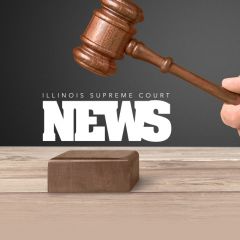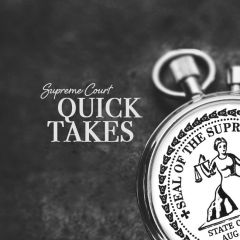Historically, guilty-plea defendants in Illinois have been denied the opportunity to present actual-innocence claims based on newly discovered evidence because their convictions were founded on valid guilty pleas. However, the Illinois Supreme Court recently held in People v. Reed that these defendants can raise claims of actual innocence under the Post-Conviction Hearing Act. Although this is a momentous victory for guilty-plea defendants, the burden they must meet is significant. In her April 2021 Illinois Bar Journal article, “Guilty Plea, Innocent Defendant,” Ashley Kidd, a law clerk for the Third District of the Illinois Appellate Court, discusses the function of plea agreements in our criminal justice system, the Reed decision, and how these claims should be presented post-Reed.
Practice News
-
April 5, 2021 | Practice News

-
April 1, 2021 |
Practice News
The Federal Bureau of Prisons seeks an administrative united states penitentiary attorney in Thomson, Illinois.
The legal practice at the United States Penitentiary located in Thomson is part of the Consolidated Legal Center (CLC), Federal Medical Center, Rochester, Minnesota. This CLC covers a wide variety of issues focusing on correctional law and litigation, either through administrative or litigation channels and includes such matters as inmate's reasonable access to the courts (through access to legal materials, legal correspondence, and attorney-client visits), conditions of confinement, medical care, diet and religious accommodations, housing assignments, hygiene and sanitation, access to information, and discipline.
-
March 29, 2021 | Practice News

Every client and trial are different. But successful trial lawyers know that winning a case requires deep preparation and attention to detail that begin long before jurors are seated and the trial starts. Recently, in an ISBA CLE titled The Eight Things Every Trial Lawyer Should Know, Illinois attorneys and judges shared characteristics all good trial attorneys have in common. The Illinois Bar Journal features their key takeaways in the April 2021issue.
Their tips and tricks cover eight aspects of trial law: presenting and arguing motions in limine, selecting a jury, making objections, establishing proofs through direct examination, controlling a witness on cross examination, handling the jury instructions conference, delivering a closing argument, and maintaining professionalism during an adversarial process.
-
March 26, 2021 | Practice News

The Administrative Office of the Illinois Courts announced today that it will receive a $100,000 grant from the National Center for State Courts (NCSC) as part of the Justice for All (JFA) Project. This is the second $100,000 grant that the Illinois Courts have received from the NCSC, with the first awarded in October 2019.
-
March 22, 2021 | Practice News

The Illinois Supreme Court’s Volunteer Pro Bono Program for Criminal Appeals currently has cases available in all five appellate districts that have complete records available and are ready to be briefed.
Attorneys who meet eligibility criteria can submit a volunteer application to the Administrative Office of the Illinois Courts.
-
March 22, 2021 | Practice News

After the U.S. Supreme Court ordered that Miller be applied retroactively regarding de facto life sentences for juveniles, the Illinois Supreme Court in People v. Buffer created a bright-line rule: Any sentence of incarceration greater than 40 years is a de facto life sentence and must comply with Miller and its progeny. This caused a stir in Illinois trial courts, as myriad postconviction petitions were filed by juvenile offenders who were serving terms longer than 40 years and seeking a resentencing under the new rules stemming from Miller. In Joseph T. Moran’s March 2021 Illinois Bar Journal article, “Juvenile Life Sentences After Miller,” Moran notes that practitioners can draw from a substantial amount of caselaw to effectively identify when resentencings are required to address a juvenile offender’s youth and attendant circumstances during a sentencing or Miller resentencing hearing.
-
March 19, 2021 | Practice News

Our panel of leading appellate attorneys reviews the two Illinois Supreme Court opinions handed down Thursday, March 18. In People v. Burge, the Supreme Court denied a defendant’s motion to withdraw her guilty plea after she asserted that it was involuntary because she was unaware she would lose her job if she pled guilty. In Ciolino v. Simon, a defamation case that arose from a documentary about an exoneration scandal, the Supreme Court considered whether the one-year window when the suit could be filed opened when the movie premiered at a publicized film festival.
-
March 16, 2021 |
Practice News
The Illinois Supreme Court announced the filing of lawyer disciplinary orders on March 16, 2021. Sanctions were imposed because the lawyers engaged in professional misconduct by violating state ethics law.
-
March 15, 2021 | Practice News

In his March 2021 Illinois Bar Journal article, “A Promise of Clear Title,” Philip J. Vacco asks whether the term “warranty deed” must be interpreted as imposing upon the seller an obligation to provide a general warranty deed. In the author’s opinion, the answer is “no.” If we give the language used in these contracts its plain meaning, Vacco writes, the seller is obligated to provide a warranty deed but, without further specification, the seller is left to his own accord as to what type of warranty deed he will deliver to meet this obligation. Given these options, Vacco asks why anyone would allow their client to provide a general warranty deed when the use of a special warranty deed meets the seller’s contract obligations.
1 comment (Most recent March 18, 2021) -
March 12, 2021 | Practice News

The Illinois Supreme Court issued one opinion on Thursday, March 11. In Jones v. Municipal Officers Electoral Board, the court examined the decision of the Municipal Officers Electoral Board for the City of Calumet City that disqualified the plaintiff as a candidate for mayor of Calumet City because he filed his nomination papers 13 days after a referendum passed that disqualified him.

